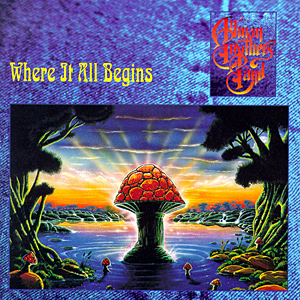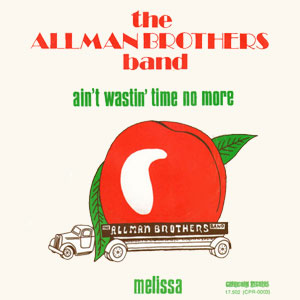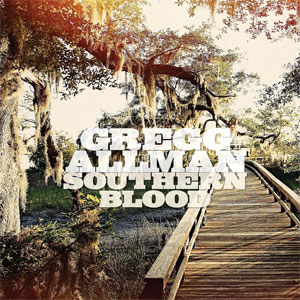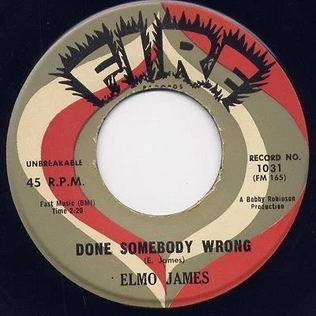Related Research Articles
In a musical composition, a chord progression or harmonic progression is a succession of chords. Chord progressions are the foundation of harmony in Western musical tradition from the common practice era of Classical music to the 21st century. Chord progressions are the foundation of popular music styles, traditional music, as well as genres such as blues and jazz. In these genres, chord progressions are the defining feature on which melody and rhythm are built.

Gregory LeNoir Allman was an American musician, singer and songwriter. He was known for performing in the Allman Brothers Band. Allman grew up with an interest in rhythm and blues music, and the Allman Brothers Band fused it with rock music, jazz, and country at times. He wrote several of the band's most popular songs, including "Whipping Post", "Melissa", and "Midnight Rider". Allman also had a successful solo career, releasing seven studio albums. He was born and spent much of his childhood in Nashville, Tennessee, before relocating to Daytona Beach, Florida and then Macon, Georgia.
Song structure is the arrangement of a song, and is a part of the songwriting process. It is typically sectional, which uses repeating forms in songs. Common forms include bar form, 32-bar form, verse–chorus form, ternary form, strophic form, and the 12-bar blues. Popular music songs traditionally use the same music for each verse or stanza of lyrics. Pop and traditional forms can be used even with songs that have structural differences in melodies. The most common format in modern popular music is introduction (intro), verse, pre-chorus, chorus, verse, pre-chorus, chorus, bridge, and chorus. In rock music styles, notably heavy metal music, there is usually one or more guitar solos in the song, often found after the middle chorus part. In pop music, there may be a guitar solo, or a solo performed with another instrument such as a synthesizer or a saxophone.

"Melissa" is a song by American rock band the Allman Brothers Band, released in August 1972 as the second single from the group's fourth album, Eat a Peach. The song was written by vocalist Gregg Allman in 1967, well before the founding of the group. Two demo versions from those years exist, including a version cut by the 31st of February, a band that featured Butch Trucks, the Allman Brothers' later drummer. Allman sold the publishing rights later that year, but they were reacquired by manager Phil Walden in 1972.

The Allman Brothers Band is the debut studio album by American rock band the Allman Brothers Band. It was released in the United States by Atco Records' subsidiary Capricorn on November 4, 1969, and produced by Adrian Barber. Formed in 1969, the Allman Brothers Band came together following various musical pursuits by each individual member. Guitarist and bandleader Duane Allman moved to Jacksonville, Florida where he led large jam sessions with his new band, one he had envisioned as having two guitarists and two drummers. After rounding out the lineup with the addition of his brother, Gregg Allman, the band moved to Macon, Georgia, where they were to be one of the premiere acts on Capricorn.

Wipe the Windows, Check the Oil, Dollar Gas is a 1976 double live album by the Allman Brothers Band.

"Call It Stormy Monday (But Tuesday Is Just as Bad)" (commonly referred to as "Stormy Monday") is a song written and recorded by American blues electric guitar pioneer T-Bone Walker. It is a slow twelve-bar blues performed in the West Coast blues-style that features Walker's smooth, plaintive vocal and distinctive guitar work. As well as becoming a record chart hit in 1948, it inspired B.B. King and others to take up the electric guitar. "Stormy Monday" became Walker's best-known and most-recorded song.

Gold is a two-CD compilation album by the Allman Brothers Band. It contains songs selected from their first eight albums, which were released by Capricorn Records — The Allman Brothers Band (1969), Idlewild South (1970), At Fillmore East (1971), Eat a Peach (1972), Brothers and Sisters (1973), Win, Lose or Draw (1975), Wipe the Windows, Check the Oil, Dollar Gas (1976), and Enlightened Rogues (1979). It was released by Island Records on October 11, 2005. It is a reissue of the 2001 expanded compilation The Road Goes On Forever: A Collection of Their Greatest Recordings.
"Whipping Post" is a song by The Allman Brothers Band. Written by Gregg Allman, the five-minute studio version first appeared on their 1969 debut album The Allman Brothers Band. The song was regularly played live and was the basis for much longer and more intense performances. This was captured in the Allman Brothers' 1971 double live album At Fillmore East, where a 22-minute, 40-second rendition of the song takes up the entire final side. It was this recording that garnered "Whipping Post" spots on both the Rock and Roll Hall of Fame's 500 Songs that Shaped Rock and Roll list and Rolling Stone's list of "The 500 Greatest Songs of All Time", which wrote, "the song is best appreciated in the twenty-three-minute incarnation on At Fillmore East."

Where It All Begins is the eleventh studio album by the Allman Brothers Band. "No One to Run With" obtained the most album-oriented rock airplay, while "Soulshine", written by Warren Haynes, gained success as a concert and fan favorite. Gregg Allman also started to confront his substance abuse problems in the past on songs such as "All Night Train". The album sold considerably better than its predecessor, Shades of Two Worlds. In 1998, the album went Gold. Nevertheless, critical reception was weaker. This was also the last studio album the group recorded with original guitarist Dickey Betts.

"Midnight Rider" is a song by the American rock band the Allman Brothers Band. It was the second single from their second studio album, Idlewild South (1970), released on Capricorn Records. The song was primarily written by vocalist Gregg Allman, who first began composing it at a rented cabin outside Macon, Georgia. He enlisted the help of roadie Robert Kim Payne to complete the song's lyrics. He and Payne broke into Capricorn Sound Studios to complete a demo of the song.
Peakin' at the Beacon is a live album by the rock group the Allman Brothers Band. It was recorded at the Beacon Theatre in New York City in March, 2000, and released later that year.

Laid Back is the debut solo studio album by American singer-songwriter Gregg Allman, released in October 1973 by Capricorn Records. Allman, best known as the vocalist/lyricist/organist of the Allman Brothers Band, first began considering a solo career after internal disagreements with that group. He developed the album as a small creative outlet wherein he would assume full control, and he co-produced the album alongside Johnny Sandlin. Laid Back was largely recorded in March 1973 at Capricorn Sound Studios in Macon, Georgia, with additional recording and mixing taking place at the Record Plant by Manhattan Recording Engineer, Jim Reeves in New York City.

"Key to the Highway" is a blues standard that has been performed and recorded by several blues and other artists. Blues pianist Charlie Segar first recorded the song in 1940. Jazz Gillum and Big Bill Broonzy followed with recordings in 1940 and 1941, using an arrangement that has become the standard.

Just Before the Bullets Fly is a studio album by the Gregg Allman Band, released on Epic Records in 1988. The album peaked at number 117 on the Billboard 200 chart.

"Ain't Wastin' Time No More" is a song by the American rock band the Allman Brothers Band. It was the lead single from their third studio album, Eat a Peach (1972), released on Capricorn Records. The song, written by Gregg Allman, largely concerns the death of his brother, Duane Allman, who was killed in a motorcycle crash in 1971.

My Cross to Bear is an autobiographic memoir of American songwriter-musician Gregg Allman, co-founder of the Allman Brothers Band. It was written by Allman and American journalist Alan Light. The book was published by William Morrow and Company on May 1, 2012. The book's title stems from the Allman Brothers Band song "It's Not My Cross to Bear" (1969). Allman first began keeping a journal in the 1980s, with the intention to possibly write a memoir at some point. He worked with Light to use that, as well as new and old interviews to create the book.

Southern Blood is the eighth and final studio album by American singer-songwriter Gregg Allman, released on September 8, 2017 by Rounder Records, four months after Allman's death. Following the release of his seventh album, Low Country Blues (2011), Allman continued to tour and released a memoir, My Cross to Bear, in 2012. However, that same year, he was diagnosed with liver cancer. His output and schedule in the intervening years gradually slowed, and Southern Blood, recorded in March 2016, became his final album. He and his backing band recorded the album with producer Don Was at FAME Studios in Muscle Shoals, Alabama over a period of nine days.

The Fox Box is an eight-CD live album by the Allman Brothers Band. It contains the complete three-concert run recorded on September 24, 25, and 26, 2004 at the Fox Theatre in Atlanta. It was released on March 24, 2017.

"I Must Have Done Somebody Wrong" is a blues song written and recorded by Eddie Kirkland in 1959. Using the same lyrics but modifying aspects of the music, Elmore James recorded it as "Done Somebody Wrong" in 1960; he took sole writing credit for it and it came to be known as an Elmore James song. "Done Somebody Wrong" was interpreted by the Allman Brothers Band in 1971 and featured on their classic live album At Fillmore East. As Billboard magazine has stated, the song became "more associated with the Allmans than with James in the end."
References
- ↑ Freeman, Scott (1996). Midnight Riders: The Story of the Allman Brothers Band. Little, Brown and Company. p. 60. ISBN 978-0316294522.
- ↑ Browne, David (27 May 2017). "Gregg Allman: 20 Essential Songs". Rolling Stone. Retrieved 21 August 2018.
- 1 2 Christopher M. Reali (2018). "The Allman Brothers Band: Conveying the Blues Idea". Rock Music Studies. 5 (2): 109–110. doi:10.1080/19401159.2017.1416448. S2CID 195007040.